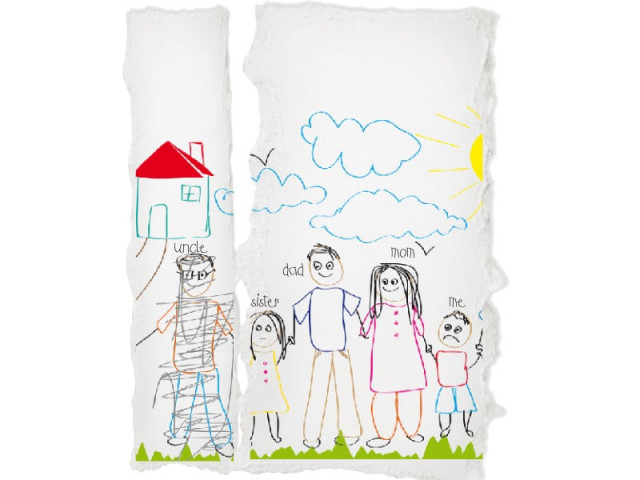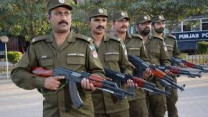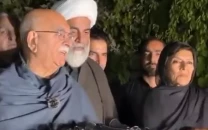Child sexual abuse: For some children, home is the most dangerous place
Though parents worry about their kids’ safety at school and parks, most abuse cases occur at home.

Protecting the innocence of their children is a parent’s greatest desire, with many going to extreme lengths to guard it. Sadly, there are too many people waiting for an opportunity to take it. For many victims that person all too often turns out to be a relative.
Anee* is 19, and a victim. She was sexually abused just after hitting puberty. Her abuser was her grandfather. He used to sneak into her bed and touch her whenever he felt the need, under the pretext that God would punish her if she tried to make him stop.
The terrified child’s ordeal continued for years. It was only when her mother confronted Anee to get an explanation for her moody behavior that Anee finally gave up her source of guilt and embarrassment. Anee’s mother kicked out her father-in-law, but the child’s emotional wounds still remain.
For Shiza*, the molester was an even closer relative. When she was just four, Shiza’s nine-year-old brother began touching her inappropriately. When she was older and finally built up the courage to say no, he raped her. This continued for years, until she finally got married and moved out. She started a new life with her husband, but her past caught up with her again. What turned out to be a diaper rash on one-year-old her baby brought back traumatic memories, and when she opened up to her husband about why she broke down, hoping that the father of her child would help her come to terms with her traumatic childhood, he divorced her.
Bena*and her brother Saad* were forced to inappropriately touch each other by their 14-year-old maternal uncle, who used to come to their home after school. He would also participate himself. By the time he finally stopped coming over, the two children continued their taboo relationship, in no small part because to the best of their knowledge, it was acceptable. It wasn’t until years later, when their parents found out that they learnt what they were actually doing.
These are but three stories from Islamabad, from what would best be called, the upper and middle classes.
Rabia Manzoor Khan, a clinical psychologist at Aga Khan Health Unit in Islamabad, said child abuse is very common in homes, and the abuser is usually a close relative or family member. She then made a startling estimation that such incidents occur in every third house in Islamabad but go unreported.
Mostly families try to suppress these incidents and end up blaming their children for “letting themselves” become victims.
“Nowadays, many such incidents are taking place among the highly educated and elite class. After dealing with many such cases, the most worrying thing which came to light was that most victims of sexual abuse can’t comprehend what they had gone through due to the age factor,” she said.
Sexual abuse transcends social class and age, but with older victims, power, be it financial or physical, tends to rear its ugly head.
On the other hand, very few people are aware of counselling options for sexual abuse victims.
While talking to The Express Tribune, Rutgers World Population Foundation (WFP) Country Head Qadeer Baig described child abuse as an “epidemic in our society”.
“Recent statistics claiming that only five children a day are sexually abused show that the crime is highly under-reported,” he said.
Baig quoted an estimate that 25 per cent of children are abused, while up to 50 per cent of disabled children fall victim to such abuse in the country.
“Also, there is high risk that children abused at an early age may become abusers when they grow up. Unfortunately, these abusers enter the home through the front door (relatives and friends of the family),” he said.
Abuse is also reported in schools and madrassas, mostly due to the lack of cheap education options for parents and children.
“Unfortunately, our education system does not focus on child protection and violates the [Convention on the Rights of the Child]. There is a huge need to educate young kids about acceptable and unacceptable forms of physical contact and to have open communication between parents, teachers and children,” Baig said.
He opined that child protection laws needs to be improved and implemented. Life skill-based education as envisaged in National Education Policy 2009 should be included in school education curriculum.
Victims, age no bound, are left physically, psychologically and socially scarred. They suffer from deep depression, anxiety, and often lose their trust and confidence in everyone. The insecurity is most pronounced in girls, who usually start avoiding contact with all men. “When they get married, they are reluctant to get intimate with their husbands. In severe cases, they attempt suicide,” Khan said.
Male victims do not fare any better. “They often grow up to become abusers, or become over ambitious in efforts to suppress the pain and suffering they are trying to hide. Conversely, they can suffer from deep depression, become very emotionally sensitive, and show hesitance to indulge in any social activity,” the doctor said, while also noting that at some scale, their opinions and thought process becomes rigid, while others may find solace in food and end up gaining a lot of weight.
Unfortunately, “It is very difficult to identify abusers as they will not disclose it themselves and will never go for counselling,” she said, because they end up thinking that what happened to them should happen to others as well.
*Names changed to protect identity
Published in The Express Tribune, February 27th, 2012.



















COMMENTS
Comments are moderated and generally will be posted if they are on-topic and not abusive.
For more information, please see our Comments FAQ